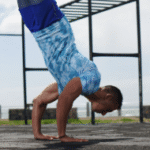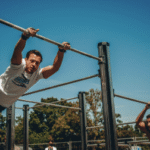Rest & Recovery for Calisthenics: Optimize Your Gains
Rest and recovery are essential components of any effective calisthenics program. While it might seem counterintuitive to take breaks from training, adequate rest is crucial for muscle growth, injury prevention, and overall progress. Here’s a detailed guide to optimizing your calisthenics gains through proper rest and recovery:
Understanding the Importance of Rest and Recovery
Muscle Growth and Repair: During intense calisthenics workouts, you create microscopic tears in your muscle fibers. Rest allows your body to repair these tears, rebuilding muscle tissue stronger than before. This process, known as muscle protein synthesis, is essential for hypertrophy (muscle growth).
Nervous System Recovery: Calisthenics training also taxes your nervous system. Rest allows your nervous system to recover, improving your ability to perform optimally during future workouts.
Injury Prevention: Overtraining can lead to fatigue, decreased performance, and an increased risk of injuries. Adequate rest helps prevent overuse injuries and allows your body to adapt to the demands of your training.
Hormonal Balance: Rest and recovery play a crucial role in maintaining hormonal balance, which is essential for muscle growth, energy levels, and overall well-being.
Mental Well-being: Rest days provide a mental break from training, reducing stress and preventing burnout.
Key Rest and Recovery Strategies for Calisthenics
Sleep:
Aim for 7-9 hours of quality sleep per night. Sleep is when your body undergoes crucial recovery processes, including muscle repair and hormone regulation.
Create a relaxing bedtime routine, avoid caffeine and alcohol before bed, and optimize your sleep environment for darkness and quiet.
Nutrition:
Provide your body with the nutrients it needs to recover and rebuild. Consume a balanced diet with adequate protein, carbohydrates, and healthy fats.
Consider supplementing with protein powder, creatine, or BCAAs to support muscle recovery and growth.
Hydration:
Drink plenty of water throughout the day, especially before, during, and after your workouts. Dehydration can hinder recovery and performance.
Active Recovery:
Engage in light activities on your rest days to promote blood flow and muscle recovery without overtaxing your body.
Examples include walking, swimming, yoga, foam rolling, and mobility exercises.
Rest Days:
Incorporate rest days into your training schedule. Aim for at least one or two rest days per week, depending on your training intensity and volume.
Listen to your body and take additional rest days if needed.
Stress Management:
Manage stress levels through relaxation techniques like meditation, deep breathing exercises, or spending time in nature. Stress can negatively impact recovery and performance.
Optimizing Your Recovery
Listen to Your Body: Pay attention to any signs of overtraining, such as persistent fatigue, decreased performance, or increased muscle soreness. Adjust your training and rest accordingly.
Prioritize Sleep: Make sleep a priority and create a consistent sleep schedule.
Fuel Your Body: Nourish your body with a balanced diet and adequate hydration.
Active Recovery: Incorporate active recovery into your routine to promote blood flow and muscle regeneration.
Vary Your Training: Include different types of workouts and training intensities to avoid overtaxing specific muscle groups.
Consider Supplements: If needed, use supplements to support recovery and muscle growth.
Manage Stress: Implement stress management techniques to reduce cortisol levels and promote recovery.
Signs of Overtraining
Persistent fatigue and low energy levels
Decreased performance and strength
Increased muscle soreness and stiffness
Difficulty sleeping
Loss of motivation and enthusiasm for training
Increased irritability and mood swings
Rest and Recovery for Different Training Levels
Beginners: May need more rest days as their bodies adapt to the demands of calisthenics training.
Intermediate/Advanced: Can typically handle more training volume and may require fewer rest days.
By prioritizing rest and recovery, you can optimize your calisthenics gains, prevent injuries, and improve your overall well-being. Remember that rest is not a sign of weakness; it’s an essential component of building a strong, healthy, and resilient body.

Rest & Recovery for Calisthenics: Optimize Your Gains
Route
Calisthenics Gym Houston Functional Bodyweight Training
Secondary phone: (346) 483-3195
Email: info@calisthenicsclubhouston.com
URL: https://calisthenicsclubhouston.com/
Monday 6:00 AM - 7:00 PM Tuesday 6:00 AM - 7:00 PM Open now Wednesday 6:00 AM - 7:00 PM Thursday 6:00 AM - 7:00 PM Friday 12:00 PM - 6:30 PM Saturday 9:45 AM - 12:00 PM Sunday 3:00 PM - 5:00 PM





